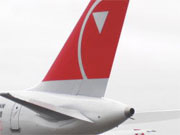Resources
| ||||||||||||||||||||
August 23, 2005
A public relations battle is underway between Northwest Airlines and its mechanics union over how well the company is weathering the effects of the union's strike. Union members walked off the job early Saturday. The airline is currently using some 1,500 replacement workers to fill in for the 2,900 striking mechanics. Gaging the success of the airline's operations so far depends on whom you're asking.
St. Paul, Minn. — For months, Northwest and the mechanics union have debated what would happen in the event of a walk-out. The union predicted the results would be serious-- maybe even catastrophic. The airline said it could out-source much of the mechanics work.
Now that the strike is underway Northwest insists its flight operations are "normal," and most media outlets are repeating that claim. Union members like Stan Martin, who was walking the picket line outside the Minneapolis-St. Paul airport, acknowledge Northwest is controlling the message.
"Well, obviously they have a corner on the media much more than we do. I mean, that's just the nature of the game. But we'll let the airplanes do the talking. When they're all parked in a week or two I think that'll speak volumes," Martin says.
Northwest's fleet is the oldest in the country. And the mechanics union says that the replacement workers won't be able to maintain it safely and effectively. Northwest counters that the workers are trained according to the federal safety standards. But some union members have gone so far as to suggest that public safety is in jeopardy.
Joe Brancatelli says that's an extreme assessment. He publishes a business travel Web site called joesentme.com.
"Northwest chose one way to spin the media, which is 'We have operations, we're flying, so we're winning,'" he said. "The unions overstated, at least initially, what they thought would happen. They told people, planes are going to be falling from the skies and they're not going to fly."
Brancatelli says the union's firey rhetoric is doing it a disservice. He says if the union really wants to prove a strike is disrupting Northwest, it would do what he's doing: count the airline's delays and cancellations since the strike began. Each day, Brancatelli samples 99 of Northwest's flights by looking at flight schedules on its website. On average, he's finding that only about half the flights are running on time. According to statistics from the U.S. Department of Transportation, last year at this time, about 81% of Northwest's flights were time.
Brancatelli says someone recently asked him whether anyone else besides him is tracking Northwest's flight information.
"And the answer is yes -- it's Northwest Airlines," he says. "That they will not release on-time performance means that their internal numbers are actually worse than the surveys we're doing."
While that's just speculation, the company certainly is keeping a tight lid on its flight information. It recently stopped posting daily on-time performance on its internal employee computer system. But Northwest's Vice President of Pperations, Andy Roberts, said over the weekend that flight information is readily available online and at the airport.
"Our customers that fly on the airline know whether we are operating our schedule on time. And the real time information displays that we operate in the airport are driven directly from our internal systems. So they reflect, minute by minute the performance of the airline," he pointed out.
But the online and airport displays only give a record of flights on that particular day of operation. Unless travellers have been glued to the departure and arrival postings on a day to day basis, they would get no sense of delay patterns.
Since most passengers are not conducting such independent research, the main message they've been hearing from Northwest Airlines so far is that "everything's fine." As long as that's the case, analysts say Northwest probably won't lose its customers.




